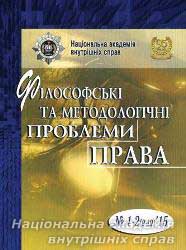Methodological Problems of Prosecutor’s Supervision of the Ending of the Investigation of Terrorist Acts
Keywords:
methodology, prosecutor, crimes of terrorist acts, legality, completion of pre-indictment
Abstract
The problems of the organization of prosecutor᾽s supervision of the ending of investigation of terrorist acts are reviewed. The methodological problems of informational and cognitive activity of the prosecutor during the investigation of the criminal proceedings' materials, completing the indictment act, decisions to close criminal proceedings of the following type are analyzed. Reported that the prosecution holds a special place in the legal mechanism to ensure the legality of pre-trial investigation on it by the Constitution of Ukraine relies supervise the observance of laws by bodies that conduct detective and search activity, inquiry and pre-trial investigation. In terms of democratization of society, of judicial control over the legality and validity of procedural decisions of the investigator that restrict human rights prosecutor᾽s supervision in this area needs to increase efficiency and effectiveness, including through its optimization through modern methodologies. There is no exception criminal proceedings for terrorist acts. According to judicial practice, significant violations of procedural law in drawing up the indictment act, which must verify the correctness of the Prosecutor, take place in the following cases. When the indictment contains provisions that contradict one another. The charges set forth in the indictment, non-specific, or does not match the charges set forth in a written notice of suspicion and declared suspect. When the indictment contains unacceptably naturalization describe criminal offense, including sexual. When the investigator does not sign the indictment. When the indictment no data on the seat of the accused, the data on the victim, if he is installed in criminal proceedings. When the indictment not specified evidence collected in the case and the arguments put forward by each of the accused in his defense, with the results of their inspection. When the guilty act is not attached statutory applications and more. Determined that at the stage of completion of pre-investigation the prosecutor a set of actions to ensure quality maintenance of public prosecution in court. He sums up the pre-trial investigation by forming an official charge, introduces the suspect, his lawyer charged with character, allowing you to identify trends, and remedies are the basis of the trial and determines its limits. In the prosecutor should emerge convinced of the reliability of the findings of guilt of the suspect and the proof of the accusations made by investigators in the indictment. Concluded that the subject of Public Prosecutions at the stage of conclusion of the investigation of crimes of terrorist acts constitute compliance pre-trial investigation and other natural and legal persons involved in the pre-trial proceedings. This definition of supervision covered as illustrative subjects during the circle and the procedure for their activities, laid down by law. Such surveillance tasks in that category of criminal proceedings should include: prevention, cessation, early detection of any violations of the law committed by parties to the proceedings, and to take measures to fully redress and prosecution established by law; full, full and impartial investigation.Downloads
Download data is not yet available.
Abstract views: 113 PDF Downloads: 274
Issue
Section
Philosophical problems of particular branches of law studies
Copyright (c) 2017 Philosophical and Methodological Problems of Law

This work is licensed under a Creative Commons Attribution-NonCommercial-NoDerivatives 4.0 International License.
- Authors reserve the right to authorship of their own work and transfer to the magazine the right of the first publication of this work under the terms of the Creative Commons Attribution License, which allows other persons to freely distribute published work with mandatory reference to authors of the original work and the first publication of an article in this magazine.
- Authors have the right to enter into separate additional agreements on non-exclusive dissemination of the work in the form in which it was published in the journal (for example, to post an article in the institution's repository or to publish as part of a monograph), provided that the link to the first publication of the work in this journal is maintained.
- The journal's policy allows and encourages the posting of articles by authors on the Internet (for example, in electronic storehouses of institutions or on personal websites), both before the submission of this manuscript to the editorial office and during its editorial processing, as this contributes to the creation of a productive scientific discussion and positively affects the efficiency and dynamics of citing the published work.




